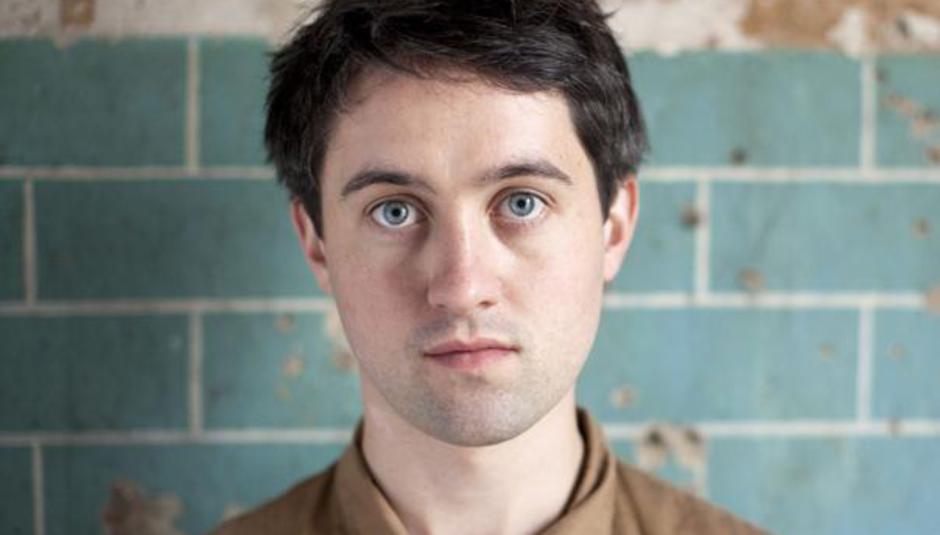Why do people fall in love with groups? Why are they prepared to suffer half thought through album tracks; barely baked experiments knocked out when an album budget is running perilously thin? Why do they eulogise these off cuts as indicators of genius that the uninitiated shouldn’t even try to grasp?
People fall in love with groups because of more than just music. Agendas – that’s why people fall in love with groups. People don’t love The Clash, The Smiths, Public Enemy and Pussy Riot purely for the music. That’s not to dismiss any of the aforementioned groups’ output; it’s just that there is more. Groups with agendas offer the listener a framework to hang their political beliefs, their world outlook, their fears and their hopes to. To admit that the band you love has flaws is to admit you are flawed.
So, why do people love Villagers?
DiS met with chief Villager Conor O’Brien before the second of their two sell-out London shows in a converted tube carriage perched atop the venue in the East End.
I remember when The Immediate [Conor’s group prior to the Villagers] went to London. We went to a big, ridiculous lawyers office who charged us a lot of money and he just looked at us and we felt like little schoolboys. He sat down and said, “This is why it’s not going to work for you. Kings of Leon, you hear them and you know what they sound like straight away. You’ve got to get a sound and you’ve got to get a manifesto, people need to know what you’re about”. I always see music and art as something that exists because it is able to infiltrate in between all the opinions, analysis, politics and all these things. It can kind of go inside all of them and cut through them a little bit. Music and words together can open up this other world that’s more than the sum of its parts.
Villagers have deservedly garnered gushing reviews for their second album {Awayland}; Conor must be delighted with the critical acclaim.
I don’t think about it really. I’m amazed that I’m somehow making enough money from it to eat. Darrin [Villagers’ manager] sends me reviews and I read stuff that people write about our music and when it’s negative, and when it’s positive, it feels so fundamentally irrelevant because the thing that reviewers and journalists don’t understand is the reason you wrote those words is because you had to. It’s not up for debate whether it’s good or bad, I’m not looking for a test score. You’re singing it because it’s the only way you can get that emotion out and usually it’s something totally inexpressible in any other fashion.
A touch reserved, warm and likable, Conor gives every question due thought, even humouring me when I venture down conversational cul-de sacs. It becomes obvious early on that he has no desire to be a spokesman; the interview for him is not an opportunity to approach the lectern and spout forth. He’s eschewed the advice of the lawyer and approaches every question openly, without an agenda. However, this is not to say he is unaware of the impact of the media coverage. In 2010 their first album, Becoming a Jackal, was nominated for the Mercury Prize eventually won by The XX.
It would have been a disaster if we’d won the Mercury. We just came out of nowhere. I was surprised we were up for it. The backlash would have been far stronger if we’d won, it wouldn’t have mattered what record we brought out now.
Folk is a word that reviewers seem to want to stitch to the hips of Villagers. It’s clear that it is an influence but so are Radiohead and Love, and they are scarcely mentioned.
There are lots of different types of folk music. When reviews mention folk they probably mean American folk music and that lineage.
When probed whether or not he considers 'folk' to be used as a synonym for Irish, an animated Conor continued:
Yeah, actually most American reviews we get say that we’re like Damien Rice and The Frames, that’s their two main reference points for Villagers which I find incredibly lazy, it’s so frustrating.
We talk about Ireland, covering a range of subjects from the Magdalene Laundries..._ "It was a church sponsored prison for women from poor families:; weekends - "I only wanted to play drums so I kept playing drums in music shops"; stage fright - "my first show ever outside of school was when I was sixteen in a pub and I couldn’t look at anybody in the face but I remember it being quite exciting and there was definitely a feeling of ‘you can do this whenever you want’" and religion.
“God of pain, a god of tragedy. God of hatred and deceit. God of hapless, helpless agony” Conor writes on the glorious 'Grateful Song' from {Awayland}. Religion is a theme that forms part of Villagers’ DNA.
That’s weird, I didn’t think I was ever going to bother with that but it keeps popping up, I wish it wouldn’t though. I wish I wouldn’t write about it but I think I do because it seems like a worthy topic. I think it’s a reaction to growing up in a really strange time in Ireland when there was suddenly this injection of cash everywhere and everybody in my middle class suburban world were suddenly elevated to this higher status. I remember becoming very cynical about it. Before it happened I was at a primary school that was much more working class. I was the middle class kid in the working class school. It was a really amazing school, I have such fond memories of growing up and being part of a community and it’s really clichéd, but it was. Everyone gathered together, the parents knew everyone; it was a really nice vibe. When I was twelve or thirteen I moved to this school that was the opposite. My folks are from a very working class background but they worked their arses off and I was the last child and they wanted to send me somewhere like that. I remember getting there and suddenly all the kids were little brats and they didn’t give a shit about anything and they had no idea about the value of anything.
It really coincided with society becoming like that as well and at the same time I was becoming obsessed with music and that became my way of finding some kind of spiritual aspect in a very materialistic society. All you ever heard about the church was some dirty old priest molesting a kid. I think I just grew to despise organised religion like most people are doing now. It’s so part of the mainstream, only a few days ago the Taoiseach apologised for the Magdalene laundries and he actually cried at the end of the speech. It was a really beautiful speech and my estimation of him went up. The last one closed in ’96, I would have been thirteen, it was still happening then. But now it’s so in the open, it’s not radical to say anything like that anymore in fact I’m planning not to say anything anymore and find new things to write about.
Villagers’ records can be valued in a number of ways. There are heartbreaking melodies, sumptuous arrangements and, more recently, production that owes more to the 808 drum machine than Dylan. These are instantly accessible qualities but lyrically Conor can be more oblique. His lyrics demand investment from the listener:
The main thing is the words should sound like part of the music. Meaning is slippery; I’m not precious about what people find from the meaning of each song, everybody’s going to see something differently anyway.
I remember the first song that I wrote was called 'Psychic' and it was about being worried that somebody could read your thoughts and the next song was called 'Big Red Van' and it was about your best friend being an inanimate object so there’s a certain sense of alienation inherent in that. Sometimes when I’m around people I tend to turn off a little bit. I have to just fake my interest in everything. When I write the songs I’m trying to forge some kind of connection with an imaginary audience.
Conor talks about music at length with quiet affection. We jump from the Pet Shop Boys to Arvo Part, Strauss to John Williams. It’s Radiohead that seem to have had the greatest impact if only as the inspiration for Conor to develop as an arranger:
I learned every guitar line on every album that I loved. I learned how to play all the drums on every record that I loved and every bass line, and every backing vocal. The main one that sticks out is OK Computer. I was 14 and Radiohead came to Dublin and that was my first ever show. I spent that whole summer just learning every part of OK Computer. Even down to trying to repeat the production techniques on my little Tascam 4-track. I was really obsessed with that album at that age. Recently a friend of mine sold me the same Tascam player so I could actually hear them but it didn’t work so I’ve got two broken ones now so I still haven’t heard them.
When I was younger it was always just about chords; I loved chords I felt obsessed. I would always remember melodies very easily. The Kinks were the biggest thing for me, before Radiohead it was always The Kinks. Then I got into Green Day, they were kind of cool when I was twelve.
Conor O’Brien is not hip. He is the polar opposite of horn-rimmed glasses and interestingly coloured skinny jeans and should be celebrated as such. It’s clear that this is not a strategy and he’s not being marketed as some sort of David to American Apparel's Goliath:
When I was growing up there was a venue you could bring your gear in and that’s it. Around the time of the Strokes coming out there were nights being put on and everyone was like that and my band were weirder than that. We played all those nights but we were a mixture of Love, the Velvet Underground and lots of psychedelic stuff. We were listening to Future Sounds of London, Harry Nielson - we had loads of weird influences so we were kind of ‘outsidery’ for a long time but that suited us because we were just in school, it wasn’t like a career or anything. We were never hugely popular because we were kind of strange.
I tried to give Conor the opportunity to define how he would like to be recognised and remembered. With a musical bottle full to the brim, the gifted songwriter, arranger, multi-instrumentalist and producer blissfully unaware of my trap designed to get him to reveal just an ounce of ego remained his unassuming self:
I find the question really hard to answer because I’ve never had the foresight to think about how we’re going to be recognised or thought about. I’ve always just tumbled into writing and tumbled into doing everything. I feel like an answer involving one of those options would be a lie. I haven’t written a full song for months and months just lots of scraps so I feel really inadequate and that’s what always fuels making the next thing.
So why do people love Villagers? There is no agenda, no manifesto and no ten-year plan hatched in a teenage bedroom, followed through with ruthless and meticulous precision. They don’t fit; they are part of no scene and are delightfully unaffected by the vagaries of the music industry. Conor has no desire to speak on behalf on any constituency, he lacks the arrogance that normally drives anyone who walks on stage and approaches the microphone.
He is a plain bird with a sweet song surrounded by peacocks and their absurd calls.
{Awayland} by Villagers is out now. Villagers play Brixton Electric in London on 21st May.
The Defenestration Of St Martin by Martin Rossiter is out now.






















